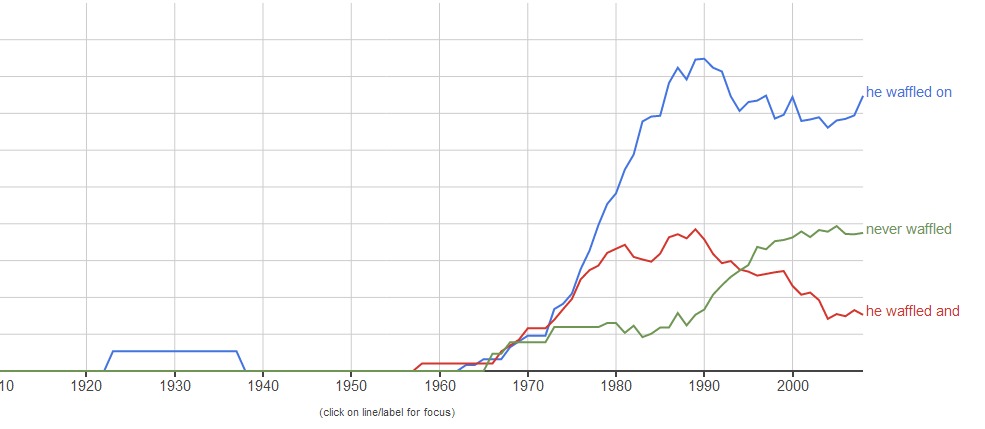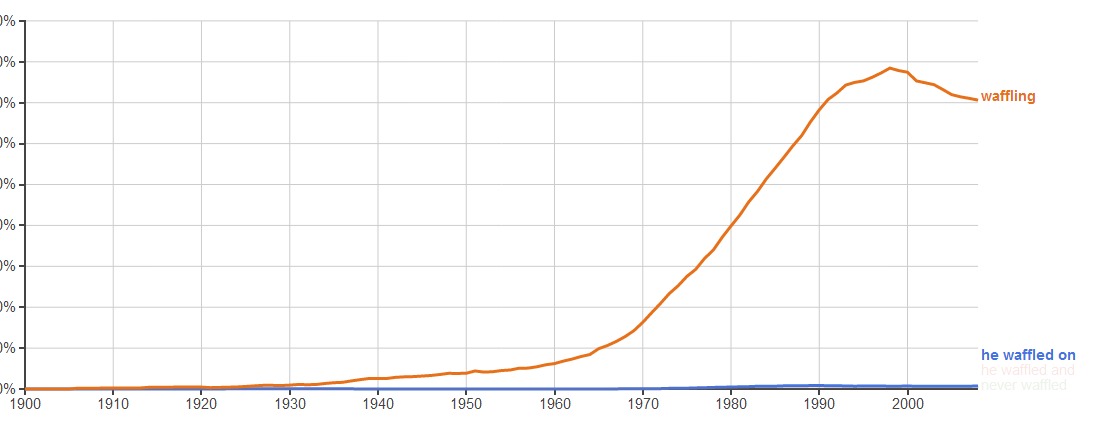Scottish dogs used to waff
American voters waffled in 2000
British politicians “waffle on” for hours
And Swedish children eat them on March 25th
Waffle
nowadays has basically three meanings:
Source: Oxford Dictionaries
- AmEng, to fail to make up one’s mind
- BrEng, waffle on speak or write, especially at great length, without saying anything important or useful
- A small crisp batter cake, baked in a waffle iron and eaten hot with butter or syrup.
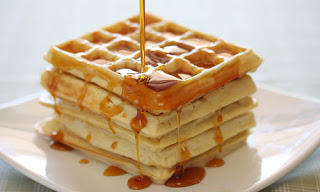
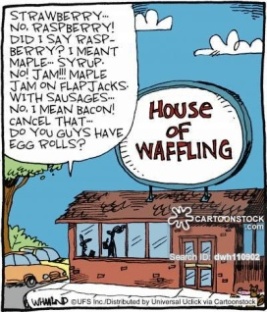
But if we investigate its etymological origins we discover much more.
From Proto-Germanic *weƀaną we obtain the verb weave (900), which has two meanings; (1) "to weave, form by interlacing yarn" (2) "to move from one place to another". From this latter term the name weevil, a small beetle, was probably derived. Weave was also the source for the Old English noun webb which meant "woven fabric, woven work, tapestry", whose meaning was later transformed to web, as in a spider's web (13th C) and cobweb (14th C).
From the the related Middle Low German wāfel the term was loaned to Middle English (1377) and became wafer. The actual woven-like waffles that we eat today arrived in the US with the first Dutch settlers in 1620 on the Mayflower and were originally called Dutch wafers. By 1735 the Dutch wafel gained an extra "f", becoming waffle.
The onomatopoeic waff (17th C) which means to bark or to yelp like a dog is, sad to say, virtually obsolete but its modern-day counterpart, woof (19th C), still thrives. From An Etymological Dictionary of the Scottish Language (1808) by John Jamieson we gleam that since at least 1678, waff and waif meant "the act of waving" and "to fluctuate" whereas waff alone, denoted someone who was worthless.
WAFF 3. Worthless. A waff fellow, one whose conduct is immoral; or whose character is so bad, no one will associate with him

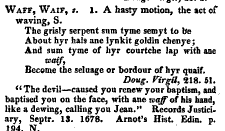
But there is no mention of it meaning to yelp or bark incessantly.
According to Random House Dictionary waffle with the BrEng meaning of talking idly, and foolishly without purpose is derived from waff (the yelp sound) and first appeared in print between 1695-1705
However I found in A Glossary of North Country Words, with Their Etymology, ... compiled by John Trotter Brockett, William Edward Brockett (1746) this snippet, which confirms that waffle in northern England was used as a verb meaning to wave and to fluctuate synonymous with wabble and derived from the German weyfelen and Swedish wefta (of which the second sounds very much like wafer to me)

Once again there's no mention of it meaning yelp.
Today in Europe, waffles are popular snacks in Belgium; Portugal; France; The Netherlands; Germany, and Sweden, whose inhabitants celebrate Annunciation Day on March 25th by eating waffles. However, in the UK they are rarely eaten for breakfast, or at any time. British people know what waffles are but they are considered primarily, an American treat.
Source:Antique Electric Waffle Irons 1900-1960: A History of the Appliance Industry in 20th Century America (2003)
Questions
- Have I got the facts straight? I have crossed-reference and triple-checked where possible but nevertheless I may have committed some errors.
When was the American to waffle (the intransitive verb, meaning to be unable to make a decision; waver) first used
and where? I've read it is connected to the Scottish waff, but I did not find any references to its first use in speech or print.Is there an explanation for the divergence in meaning between the BrEng sense i.e. Lengthy but vague or trivial talk or writing (OED) and its American counterpart? The verb is largely derogatory, which I find particularly curious.
And finally, has this divergence narrowed? Are American speakers familiar with the UK sense and vice-versa?
EDIT TO BOUNTY
To clarify, because I realize the wording may have been misinterpreted. Can anyone find an American citation, quote, quotation, excerpt etc. with the term waffle meaning to vacillate dated before 1962?
Not one answer has so far attempted to explain the divergence between the US and the UK meaning of waffle. I know it's not easy, but that's why I've put up 350 points.
Phew!

